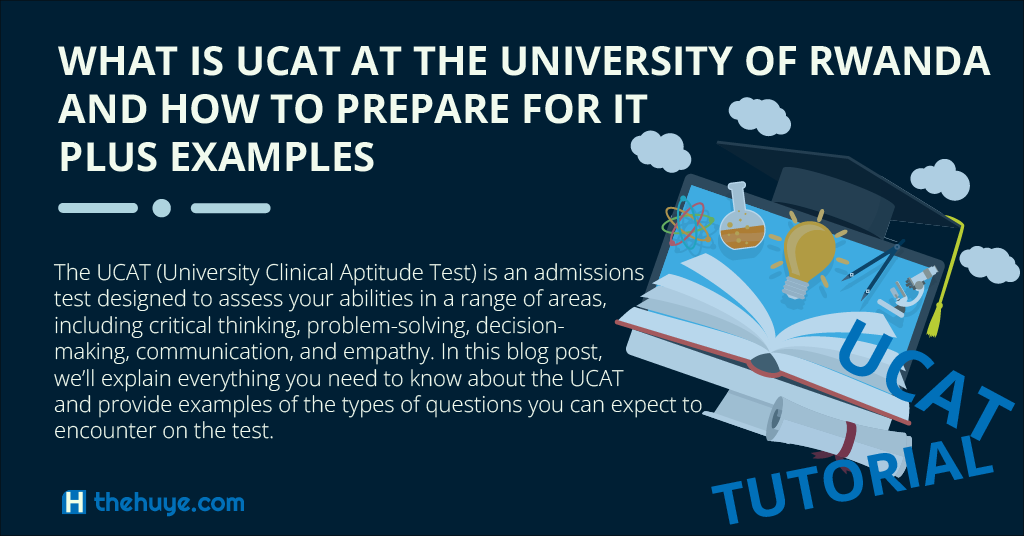If you’re considering applying for an undergraduate course in medicine, dentistry, or other health-related fields in the University of Rwanda, UK, Australia, or New Zealand, you will likely need to take the University Clinical Aptitude Test (UCAT).
The UCAT is an admissions test designed to assess your abilities in a range of areas, including critical thinking, problem-solving, decision-making, communication, and empathy. In this blog post, we’ll explain everything you need to know about the UCAT and provide examples of the types of questions you can expect to encounter on the test.
Table of Contents
How To Register For UCAT At The University Of Rwanda?
Before you do the UCAT examination at the University Of Rwanda you must have applied to the Bachelor of Medicine and Surgery or Bachelor of Dental Surgery then when you see yourself on the results you can procced with the registration of UCAT examinations which is done online.
See more here
VIDEO: Click-Here-To-See-How-To-Register-For-UCAT
READ: Read-Here-To-See-How-To-Register-For-UCAT
What Is UCAT At University of Rwanda?
The UCAT is a computer-based ( Mostly done on a paper for UR students) test that is used by universities to assess the aptitude of applicants for health-related courses. Below you will find examples and tutorials. The test consists of five sections:
- Verbal Reasoning
- Decision Making
- Quantitative Reasoning
- Abstract Reasoning
- Situational Judgment.
Verbal Reasoning
Verbal Reasoning: This section assesses your ability to critically evaluate information presented in written form. You’ll need to read passages of text and answer questions that test your comprehension and ability to draw inferences.
EXAMPLE:
A local council has decided to ban smoking in all public spaces, including parks and beaches. Which of the following statements best summarizes the reasons for this decision?
a) The council wants to encourage people to lead healthier lives.
b) The council is responding to pressure from anti-smoking campaigners.
c) The council is concerned about the environmental impact of cigarette butts.
d) The council wants to reduce the risk of fires caused by discarded cigarette butts.
Decision Making
Decision Making: In this section, you’ll be presented with scenarios and asked to make decisions based on the information provided. You’ll need to use your reasoning skills to evaluate the options and choose the most appropriate course of action.
Example:
A 15-year-old boy comes to the clinic complaining of a headache. He has no other symptoms, and his medical history is unremarkable. Which of the following is the most appropriate course of action?
a) Refer the boy to a neurologist for further evaluation.
b) Prescribe painkillers and advise the boy to rest.
c) Ask the boy to keep a headache diary and come back in a week.
d) Order an MRI scan to rule out any underlying conditions.
Quantitative Reasoning
Quantitative Reasoning: This section assesses your ability to use numerical data to solve problems. You’ll need to interpret graphs and tables and perform calculations to answer questions.
Example:
A company has a workforce of 500 employees. Of these, 60% are women and 40% are men. If 25% of the women and 10% of the men are managers, how many managers does the company have?
a) 40
b) 70
c) 100
d) 150
Abstract Reasoning
Abstract Reasoning: This section assesses your ability to identify patterns and relationships in abstract shapes and designs. You’ll need to use your spatial reasoning skills to identify the rules that govern the patterns.
Example:
Which of the following shapes completes the pattern?
Situational Judgment
Situational Judgment: In this section, you’ll be presented with scenarios and asked to choose the most appropriate course of action from a set of options. The scenarios will test your ability to make ethical decisions and communicate effectively.
Example:
You are a doctor on duty at a hospital emergency department. A patient comes in with a minor injury but is demanding immediate treatment. The department is busy and there are other patients with more serious injuries. Which of the following is the most appropriate response?
a) Explain that the patient will need to wait their turn.
b) Give the patient priority to avoid causing a scene
c) Inform the patient that their injury is not serious, and they should seek treatment elsewhere.
d) Ask a colleague to attend to the patient while you attend to other patients.
Preparing for the UCAT
The UCAT is a challenging test, and it’s essential to prepare thoroughly to give yourself the best chance of success. Here are some tips to help you prepare for the UCAT:
- Familiarize yourself with the test format and question types.
- Use online resources and practice tests to get a feel for the types of questions you’ll be asked.
- Develop your time management skills and practice working under pressure.
- Focus on building the skills the test is designed to assess, such as critical thinking, problem-solving, and decision-making.
- Seek guidance from teachers, tutors, or UCAT preparation courses if you need additional support.
EXAMPLE SECTION
Below are the documents on which you can study from.
Conclusion
In conclusion, the UCAT is an important part of the application process for health-related courses in the UK, Australia, and New Zealand and adopted by University Of Rwanda. The test assesses a range of skills that are essential for success in these fields, and it’s essential to prepare thoroughly to give yourself the best chance of success. By familiarizing yourself with the test format and question types, practicing regularly, and developing the skills the test is designed to assess, you can improve your chances of achieving a high score and securing a place on your chosen course.

TheHuye.com is an educational, informational website that provides information and news related to the universities operating and located in Rwanda. We mainly aim at providing on date information for our readers and other professional help they may need. Our main goal is to help 10, 000 students this year secure places in their favorite universities in Rwanda and pursue their career of choice. TheHuye editorial Team wrote this article.


